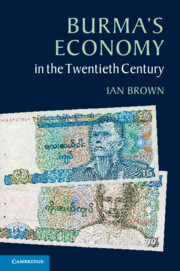Book contents
- Frontmatter
- Dedication
- Contents
- List of Illustrations
- List of Tables
- Note on names
- Acknowledgements
- Map of Burma/Myanmar
- Introduction
- 1 The economy at the beginning of the twentieth century
- 2 Strains in the late colonial economy
- 3 War and independence
- 4 In pursuit of socialism
- 5 Toward the market: the economy from 1988
- Conclusion: themes and threads
- Bibliography
- Index
- References
Conclusion: themes and threads
Published online by Cambridge University Press: 05 June 2014
- Frontmatter
- Dedication
- Contents
- List of Illustrations
- List of Tables
- Note on names
- Acknowledgements
- Map of Burma/Myanmar
- Introduction
- 1 The economy at the beginning of the twentieth century
- 2 Strains in the late colonial economy
- 3 War and independence
- 4 In pursuit of socialism
- 5 Toward the market: the economy from 1988
- Conclusion: themes and threads
- Bibliography
- Index
- References
Summary
‘The tragedy of Burma’, asserted an editorial in The Times in April 2012, ‘is that, on most measures, it held the brightest prospects of any country in South-East Asia when it won independence in 1948.’ As an earlier chapter in this book made clear, this is far from the truth. On independence, Burma was a barely functioning state. Its transport infrastructure and industrial plant – the oilfields and the refinery at Syriam, the rice mills and timber mills at the ports – had suffered huge damage during the war, and only limited reconstruction had been completed in the two years since the British had reoccupied Burma at the end of the war. With the departure of British and Indian officials at the close of colonial rule, there were too few trained and experienced Burmese to run a modern economy, society, and administration. And finally, the stability – the very survival – of the new state was seriously threatened by communist and ethnic insurrections. Burma's prospects in 1948 were poor.
Much of Burma's damaged inheritance on independence was not beyond repair. Railway lines could be relaid and the oil refinery rebuilt; with education and training, an effective Burmese administration could be created, although this would certainly be a greater challenge than rebuilding the railway network; and, a still greater challenge, the communist and ethnic insurgents might in time be defeated or reconciled. But there was one, arguably damaging, inheritance that was hugely resilient. This was the Burmese rejection of the colonial economic structure, manifest in the three core ambitions of independent Burma's economic strategy – the nationalization of foreign interests, the Burmanization of the modern labour force, and state-led industrialization.
- Type
- Chapter
- Information
- Burma's Economy in the Twentieth Century , pp. 203 - 213Publisher: Cambridge University PressPrint publication year: 2013



